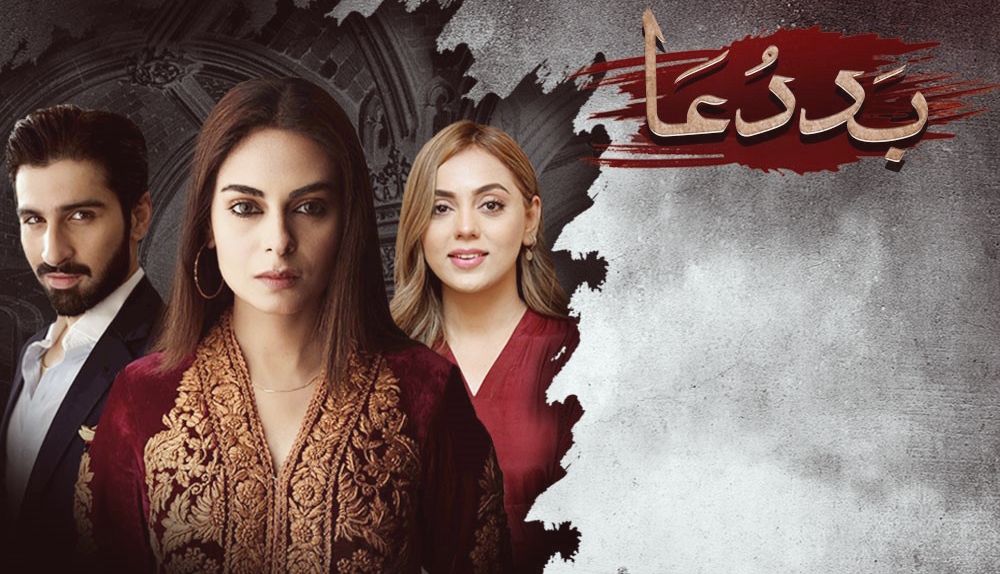“Baddua” is a show that appears to be following the path of past shows like “Khudparast” and “Dil Mom Ka Diya,” shows which punish a woman for going against the grain and being “bad.” And yet, it’s always difficult to judge a show or pan it before the final episode, because one cannot predict what the ultimate “message” is before the finale. Starring Amar Khan, Muneeb Butt, Osama Tahir, Maryam Noor, Salma Hassan and others, “Baddua” has been written by Samina Aijaz and directed by Ramish Rizvi. The story follows Abeer, a woman who is willing to trample others in her life in order to get what she wants. After marrying Junaid, her best friend’s fiancé, she now finds karma coming back to haunt her.
What’s concerning about shows like “Baddua” is that it follows a pattern – a show that works towards the female lead’s eventual “punishment,” a punishment the audience is awaiting and ready to cheer for. We’ve seen it in previous shows like “Khudparast,” where an abused woman throws her hands up in exasperation and decides to take matters into her own hands – and gets punished for it with AIDs while her abusive husband gets off scot-free. We’ve seen it in “Dil Mom Ka Diya” where a brash, horribly behaved woman who didn’t want to be forced into marriage winds up with an ill husband and it’s her “punishment” to care for him. This is not making excuses for badly behaved female characters, but why don’t our shows focus more on the positive lives of the “victims” and how they move on happily, leaving the mess behind them.
Instead of focusing on Abeer’s punishment, it would be much better to see Neelam and Affan living a happy life. Instead, we are witnessing Neelam overreacting for Affan’s momentary lapse in judgement. Sure, Affan was wrong for mistrusting Neelam, but the two had an arranged marriage and she barely even explained her past with Junaid, simply trying to brush over it – and Junaid is Affan’s childhood friend. This would obviously make Affan feel like a third wheel of sorts and he did need that reassurance and an honest, open exchange. This is where many Pakistani dramas falter, underplaying the importance of an open husband-wife relationship where the two actually communicate and talk out their issues. Affan and Neelam’s marriage should have been in the clear at this point had they sat down and discussed the situation instead of Affan thinking Neelam loved Junaid and Neelam believing she could wake up the next day and act as though nothing had happened. This is bizarre.
Abeer (Amar Khan) has now been badly “exposed” by Mohsin’s mother and Junaid (Muneeb Butt) now wants to divorce her. But surprise! Abeer is pregnant. This is a nice way to keep Abeer in that household, but why can’t the real discussion take place – a discussion that involves the fact that Junaid has had multiple girlfriends after his marriage to Abeer while Abeer has been the spitting image of a perfect wife, having eyes only for her husband and even nursing him back to health after his accident. How quickly he has forgotten everything she has done for him and we are supposed to continue blaming her for Mohsin’s suicide.
Yes, Mohsin’s suicide was tragic, but is it really logical to blame another individual for suicide? Suicide is an action taken by a mentally unwell or emotionally unwell individual in a weak moment. Sure, Abeer is a horrible person – that’s not something that can be argued. But she did not force Mohsin to kill himself. She simply decided, in a mean way, that she no longer wanted to be with him. This is life. As human beings, we suffer these losses and move on. When will our dramas stop “blaming” for this?
Again, it’s difficult to label “Baddua” at this point, because that finale episode is what ultimately makes or breaks a show. It’s in the finale that we get that overall message. However, up until now, “Baddua” is a difficult pill to swallow, laying heavy on the blame game with an enthusiastic audience ready for Abeer’s “punishment.”
